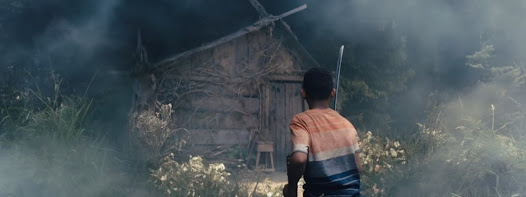 |
| The lair of The Water Man |
The screenplay offers a clunky exposition. Dad embitters Gunner by spilling ink on his graphic novel while brandishing that totem of toxic masculinity, a football. Ruining someone's artwork or journal to motivate a dramatic reaction was a cliché by the time of Little Women or Peck's Bad Boy. Traces of topicality are sprinkled for cultural relevance: those darn graphic novels, blue haired pixies, BIPOC, wild fires and jokes about veganism. Despite this and many rehashes of old tropes, the film is redeemed by a solid cast and engaging visuals. The two leads have a nice rapport and Ms. Miller is a find. Alfred Molina, Maria Bello and Jessica Oyelowo are more than adequate in support.
The movie takes flight whenever we are in the Oregon outdoors with the runaway juveniles. Mr. Oyelowo cannot transcend the screenplay in domestic interiors, but is able to imbue the already beautiful Oregon woodlands with splendor and a touch of magic. The vivid and glowing colors captured by Matthew J. Lloyd's cinematography are more memorable than the hackneyed plot. Set design and decoration are top notch. The animation, which is used to give us the back story of the title character, is merely OK.
The film is overly indebted to Spielberg, there is even an E.T. lunchbox on display at one point. The gooey spiritual slush of the Amblin' maestro lurks here, as does E.T.'s successful regurgitation into Stranger Things. Still, Emma Needell's script is self aware. Jo, revealed at the end to be a huckster, is introduced preaching to her erstwhile followers in a graffiti filled abandoned warehouse that functions as a neo-church. The film's ending's acknowledges that what we must love is finite not infinite. Myths and legends come from not above, below or beyond, but from our daily struggles and strife. A message I am happy to swallow along with a bit of sugared goo.





No comments:
Post a Comment